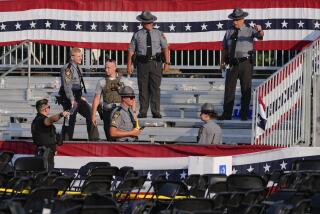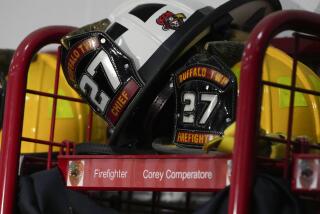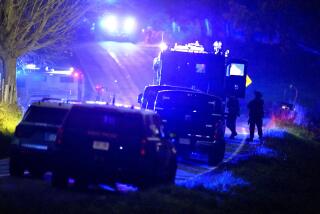Eric Frein arraigned in trooper slaying case
- Share via
In the end, Eric Frein went without a whimper.
The highly trained survivalist was caught unarmed in an open field, made to kneel on the ground and restrained with the handcuffs of the state trooper he is accused of having shot seven weeks earlier.
Following a carefully orchestrated plan full of symbolic meaning for the state police, Frein was driven in the dead trooper’s patrol car to the police barracks that authorities say he targeted on Sept. 12.
Frein, 31, who faces the death penalty, was arraigned Friday on charges including murder and attempted murder, and held without bail. A crowd of onlookers shouted taunts including “Rot in hell!” and “You’re a coward!” as he was led away after the brief hearing.
A routine “sweep and search” patrol by 13 U.S. marshals — part of a large federal force including FBI, ATF, and Border Patrol — surprised Frein in a field outside an abandoned airport hangar, one of several in the Pocono Mountains.
He complied when he was ordered down on the ground and readily identified himself as the man whom police had been seeking since his car was found in a pond three days after the shooting.
Frein had traveled 33 miles through thick forests. He was spotted sometimes but always managed to get away from police.
Two of the marshals who arrested Frein told the Morning Call newspaper in Allentown, Pa., that they first spotted a black hat standing out above some tall grass.
Police said he had apparently been staying in the hangar for several days. They discovered weapons inside, but police declined to say what kind or what else they found.
When Frein was taken to court Friday, his face was marked with red scrapes and his nose appeared swollen and bruised, but police said there was no struggle during the arrest, stating that Frein had suffered the wounds during his flight through the woods.
Prosecutors said Frein was talking. “We have now started to find the answers that the community desired in this case,” Pike County Dist. Atty. Ray Tonkin said. “The families in this matter ... will never be the same, but today we find some comfort as a community that we are taking these next steps toward justice.”
Although members of the community speculated that Frein might have had a grudge against one of the troopers, police said State Police Cpl. Bryon Dickson and Trooper Alex Douglass appeared to have been targeted at random. Douglass was seriously injured, but is recovering.
New details of the shooting were released Friday in court documents.
Dickson was walking out the front door of the Blooming Grove barracks after finishing his shift at 10:50 p.m. Sept. 12 when he suddenly dropped to the ground, according to an affidavit signed by three troopers.
Civilian communications officer Nicole Palmer saw Dickson lying motionless, and asked him what had happened. Dickson, a Marine veteran with two young sons, told her he had been shot and needed help.
Then another shot was fired, driving Palmer inside. When she returned to Dickson, he asked her to bring him inside, but she was not able to, according to the affidavit.
Douglass, who was about to start a shift, was walking toward the barracks from a lower parking lot. As he approached Dickson lying on the ground, he was also shot but was able to crawl into the lobby. Four shots were fired in 90 seconds, the affidavit says.
It was only when other troopers drove a patrol SUV to the front of the parking lot to serve as cover that Dickson and Douglass were able to get help. Douglass was evacuated by helicopter to a hospital in Scranton. Dickson, 38, was pronounced dead at the scene.
Although some people in the community were baffled at how Frein could stay at large for weeks despite a search that at times reached 1,000 people, police officials at news conferences Thursday and Friday made it clear that their primary objective was to avoid another fatality.
“Eric Frein was dedicated to killing law enforcement officers,” Pennsylvania State Police Commissioner Frank Noonan said. “I can’t think of a more dangerous occupation than going into those woods” looking for him.
Police only entered the woods in teams. Several times when they spotted him they did not give chase, fearing that Frein would ambush them with a rifle or with explosives.
Noonan said “every square inch” of the forest was divided into grids for searching, but police knew that as soon as they had cleared an area, he might come back.
They placed numerous cameras in the woods, a tactic usually employed by wildlife researchers.
“It’s a hot, tiring and dangerous job,” Noonan said, thanking all those who assisted in the search.
“The reason this took so long was that this was a big wooded area that he was totally familiar with and that he had a lot of places to hide in,” Noonan said. “He was dedicated to killing law enforcement members and we had to be very careful how we searched.”
Times staff writer Christine Mai-Duc in Los Angeles and the Allentown, Pa., Morning Call contributed to this report.
More to Read
Sign up for Essential California
The most important California stories and recommendations in your inbox every morning.
You may occasionally receive promotional content from the Los Angeles Times.











